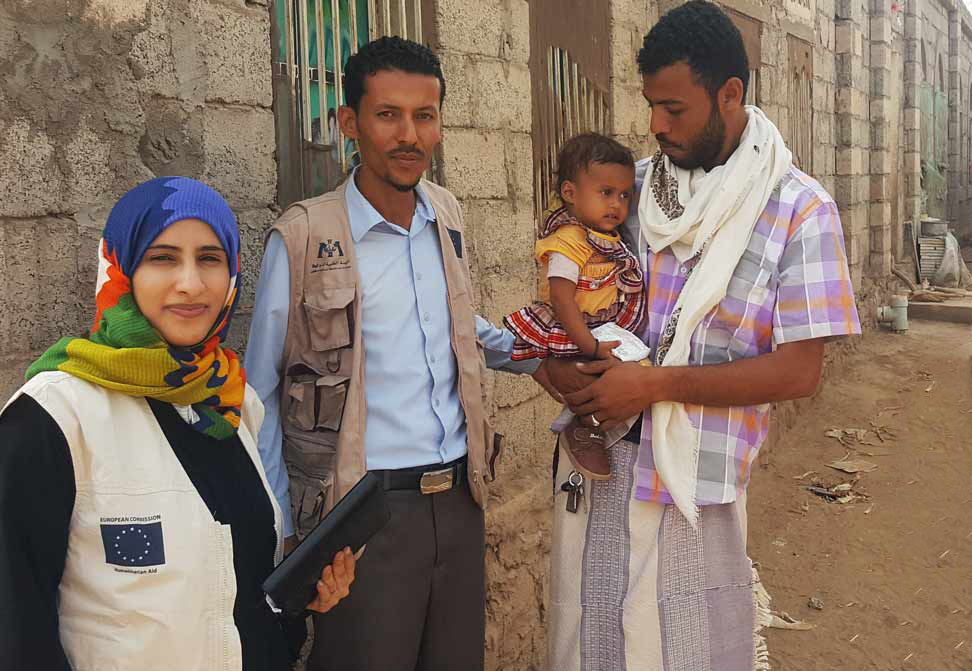
Cholera Outbreak in
Yemen
International Medical Corps is responding to control the world’s largest cholera outbreak in Yemen. At its peak in the late summer of last year newly reported suspected cases were running between 4,000 and 5,000 a day, however in recent weeks, both the rate of newly reported cases and the fatality rate have declined significantly.
By late December, 2017, the World Health Organization reported the total number of suspected cases had crossed the 1 million mark, citing just over 1,005,000 cases. The outbreak extends over all but one of the country’s 23 governorates. More than four in ten of those affected are children younger than 15. More than 2,200 deaths have been associated with the epidemic since it spiraled out of control in late April.
Concerns have risen further with a diphtheria outbreak that began in Ibb governorate last year and since November has spread to 18 governorates, involving over 380 people and causing nearly 40 deaths. Without the required vaccines and medicines needed to treat the disease, it has the potential to spread quickly because the bacteria is transmitted through the air by simple coughing and sneezing. The current siege of Yemeni air and sea ports threatens to worsen the situation by making it difficult to deliver needed medications in a timely manner.

Largest Outbreak
While cholera is endemic to Yemen, the current outbreak is the largest in recent memory
Civil War
Yemen’s civil war complicates effort to control the outbreak and treat those affected
WASH
Half of Yemen’s population of 27 million lacks clean water, sanitation and hygiene services, a condition that increased the risk of infectious diseases
Frequently Asked Questions
-
What is Cholera?
Cholera is transmitted by bacteria that live in contaminated food and water, causing severe watery diarrhea that can lead to intense dehydration and death with alarming speed if not treated.
-
Why is Yemen vulnerable to cholera and why is the outbreak so virulent there?
Poor sanitation conditions have contributed to the current outbreak. Half of Yemen’s population of 27 million lacks clean water, sanitation and hygiene services. All of these condition increase the risk of infectious diseases. In addition, Yemen’s civil war has eroded further the already limited capacity of the country’s health care system to respond to a public health emergency.
-
Was Cholera brought into the country from outside or is it endemic to Yemen?
Cholera is endemic to Yemen. About 7.6 million Yemenis—roughly a quarter of the country’s population—live in areas at high risk of cholera transmission.
-
Is it possible to vaccinate against cholera?
Yes, oral vaccination against cholera is available and as recently as mid-June, the World Health Organization described plans to send 1 million doses of cholera vaccine to Yemen to help blunt the epidemic’s rapid spread. However, those plans were dropped after authorities assessed the practical realities on the ground in Yemen and concluded it was impractical to attempt such a vaccination campaign during a civil war in a country whose health system was on the verge of collapse.
-
How do you treat someone infected with the cholera bacteria and how can you slow the pace of the outbreak without vaccines?
Treating cholera effectively requires two steps: stopping the diarrhea that can cause life-threatening dehydration if not brought under control quickly, and rehydrating patients. International Medical Corps operates both Diarrhea Treatment Units and Oral Rehydration Points in Yemen. Spreading knowledge about the importance of using clean water and practicing proper sanitation and hygiene techniques can have a significant impact in slowing the spread of an outbreak.
The Challenges
Our Response

International Medical Corps moved quickly to implement treatment and prevention measures to contain the Cholera outbreak as it gathered pace. We began work in four of the most severely hit governorates that included the capital, Sana’a, the southern port city of Aden, as well as Taizz and Ibb. We have established Diarrhea Treatment Units and Oral Rehydration Points, distributed hygiene kits, water purification tablets, and IV fluids and expanded our operations to include the additional governorates of Lahj and Al-Dahlee.
International Medical Corps currently operates 33 oral rehydration points and supports two diarrhea treatment units and six diarrhea treatment centers in an area that spans six of the 21 governorates in Yemen affected by the cholera outbreak. We are providing essential medications and IV fluids to established sites, enabling them to extend quality services to cholera patients. We also continue to conduct awareness sessions about the dangers of Cholera and how to prevent it. Since the outbreak spiraled out of control in April of this year, we have supported a total of 100 Cholera treatment facilities.
International Medical Corps has already trained hundreds of Community Health Volunteers (CHVs) on cholera emergency response techniques and recently conducted refresher training for response, awareness and referral of suspected cases to Cholera Treatment Centers (CTCs) have been mobilized. In Aden, International Medical Corps has ongoing programs involving hygiene promotion and water, sanitation and hygiene activities. As part of the response, International Medical Corps plans to disinfect wells in locations not covered by potable water distribution.
In response to reports of a diphtheria outbreak in Ibb governorate, our Rapid Response Team in Yareem district will be proactively raising awareness, identifying cases and doing case management, including the provision of medicines to people impacted by diphtheria.


